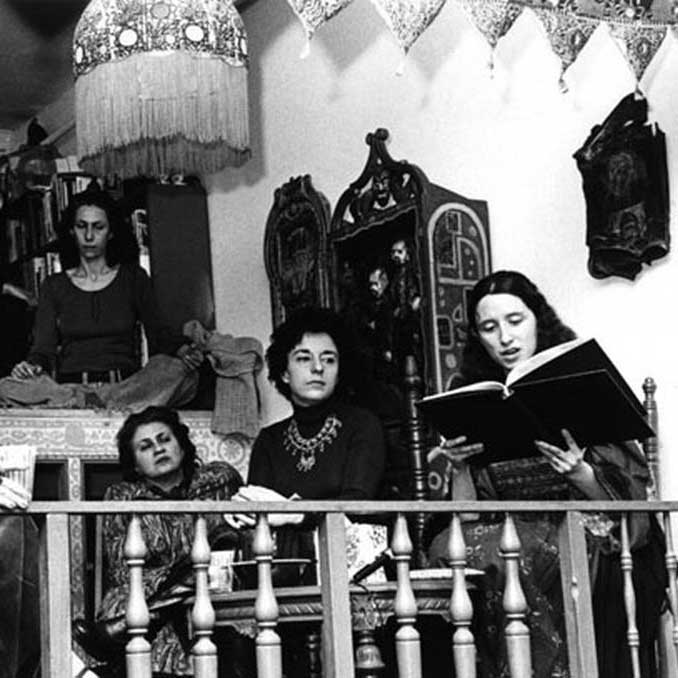Portugal // What is the Feminist Reading Assembly?~ 5 min

By the Lisbon Feminist Assembly
Even before the famous consciousness-raising groups and feminist book clubs started appearing during the second wave of the north-American feminist movement (60’s and 70’s), women’s participation in groups dedicated to the discussion of literary texts was already historical fact since the Enlightenment.
It is not irrelevant that women have, for centuries, dominated the arena of reading clubs – presented as spaces dedicated to literary education and sharing, these were also often the places where women had the best opportunity for making their own voices heard, and intellectually fostering themselves. Bearing this idea in mind, and faced with the need to reconnect feminist thinking and activism, the women of the Assembleia Feminista de Lisboa (AFL or Lisbon Feminist Assembly) decided to bring back the practice of the reading club.
The Feminist Reading Assembly takes place once a month in Lisbon-based associations that serve as friends and allies to the feminist cause and who are kind enough to provide us with a place for an afternoon of reading. The sessions have a scheduled time and place but no duration limit. The topic and the amount of material brought by the participants dictates the time required – which is never enough – for the discussion, which drags on throughout the afternoon. We envisioned it as a true “reading assembly” – a democratic space in which each reading gives way to a serious discussion on a concrete concern of the feminist praxis.
The first session, which took place in June under the topic “Feminist Writing and Thought”, revealed a need for some control over the circumscription of the topics at hand. So as not to run the risk of personalizing the discussion, and to avoid introducing distinct topics with each new intervention, we decided to implement a degree of moderation – a function which merely ensures that the debate does not stray too far from the chosen topic.
After the second session, which occurred in July and was dedicated to the discussion of “Equality in Formal Rights”, we also started sending out monthly newsletters containing a summary of the session and a list of the texts read. Who knows what new ideas the next session (“Feminism beyond the Feminist Waves?”, scheduled for late September) might bring forth?
It is important to note that the Reading Assembly sessions are not mixed events, meaning that they are female-only spaces. This decision was made having in mind the experience of women’s groups over the past decades, whose political strength was only able to grow after their separation from their male comrades – particularly evident in socialist/left-wing and civil rights movement groups in the USA. Women and their struggles were always relegated to the background by their political partners (who were, in many cases, their romantic partners).
As such, we believe that it is not yet possible to construct female emancipatory thought in mixed groups, due to the fact that male concerns, considered to be universal, still take the center stage. On the other hand, there is a tendency in male groups to turn to leader worshiping and infighting, behaviors that we strive to defy and want to avoid at all costs in our political practice. There is, however, the will to establish other kinds of events for theoretical and political discussion among our male companions, so as to debate common concerns and solutions, as well as differences and incompatibilities.
Reading as an act of resistance
It was this understanding of a reading club as a horizontal space, created and re-created by its participants, that helped guide the organizing of these first sessions. We envisioned the construction of a space dedicated to the in-depth theoretical study of feminist agendas, yes, but we were also looking to promote a kind of debate that isn’t so estranged from activism as to lose touch with reality. A non-academic space that recognizes the importance of theory only insofar as it is in constant dialogue with praxis, drawing from but also returning to it. A reading club as an act of resistance. Resistance to the depoliticization and hollowing out of feminism as a mass movement, by horizontally sharing the theoretical legacy of the feminist movement, but also resistance to the traditional, patriarchal ways of doing politics.
For that purpose, we promote the reading not only of the greater academic theorists, but also of women who write in blogs or other platforms, and who aren’t formally recognized as theorists but do create true feminist theory and thought – always in dialogue with the past, but making a current analysis of women and society.
It is our goal to share the work of these women, more or less unknown, most of them with no academic profile, but who are effectively building modern-day feminism. Promoting the idea that theory isn’t static, that it is constantly growing in contemporary analysis, and above all else, that the great feminist theorists have also theorized outside of the academy, have not had immediate recognition, and have produced thought through contact with women’s direct experiences, especially in consciousness-raising groups.
In a time when feminism is back in the spotlight and loud protests occupy the streets all over the world (the latest feminist protests in Mexico come to mind), it is fundamental to stop the movement from being absorbed by the structures of power, transforming into a horde of alienated women who are willing to accept the terms of the system without any further questioning.
It is necessary to resist mainstream neoliberal feminism, a feminism which exalts glitter and trivialities and is an ally to the capitalist system, a feminism which prioritizes the concept of individual choice over the dismantling of structures of power and oppression, and which has made the commodification of the bodies and struggle of women its foundation.
It is in this context that resuming the practices of our predecessors, rehabilitating women’s spaces, listening to them again, listening to ourselves, fearlessly sharing our innermost concerns and realizing that we are not alone – that we will never again be alone – is the first step towards envisioning a real change of paradigm, one that will no longer be dictated by the interests of the patriarchy.




